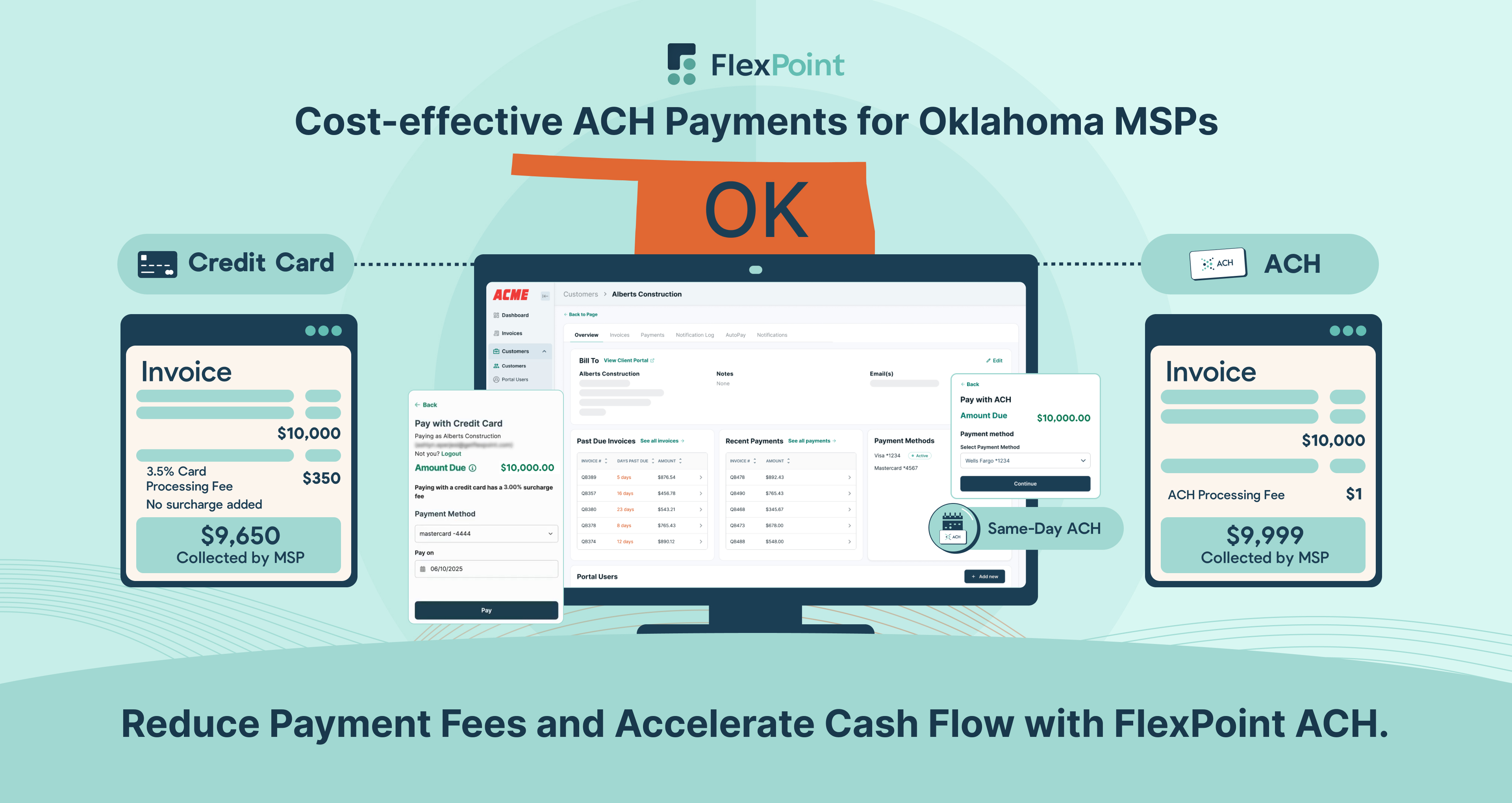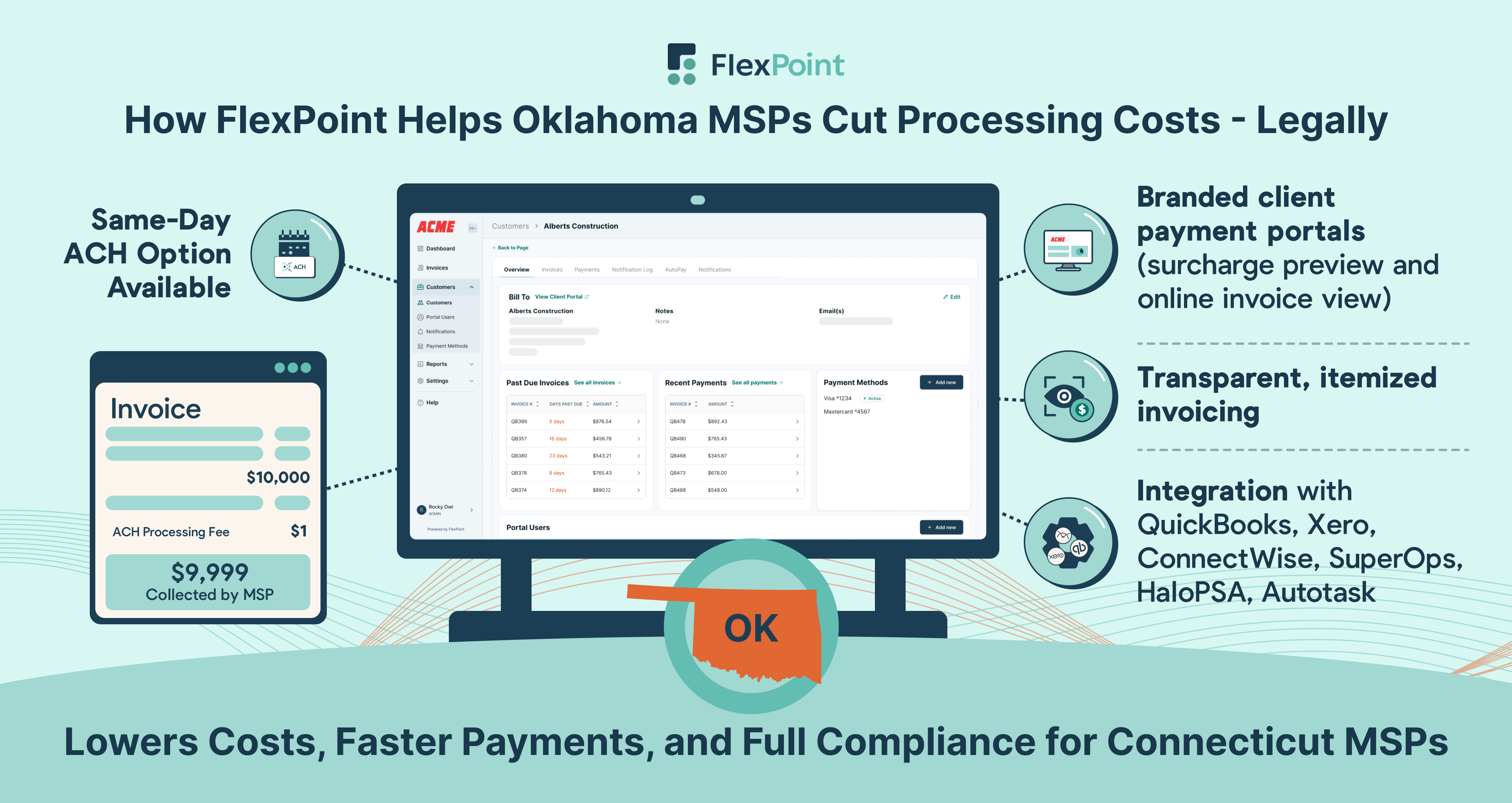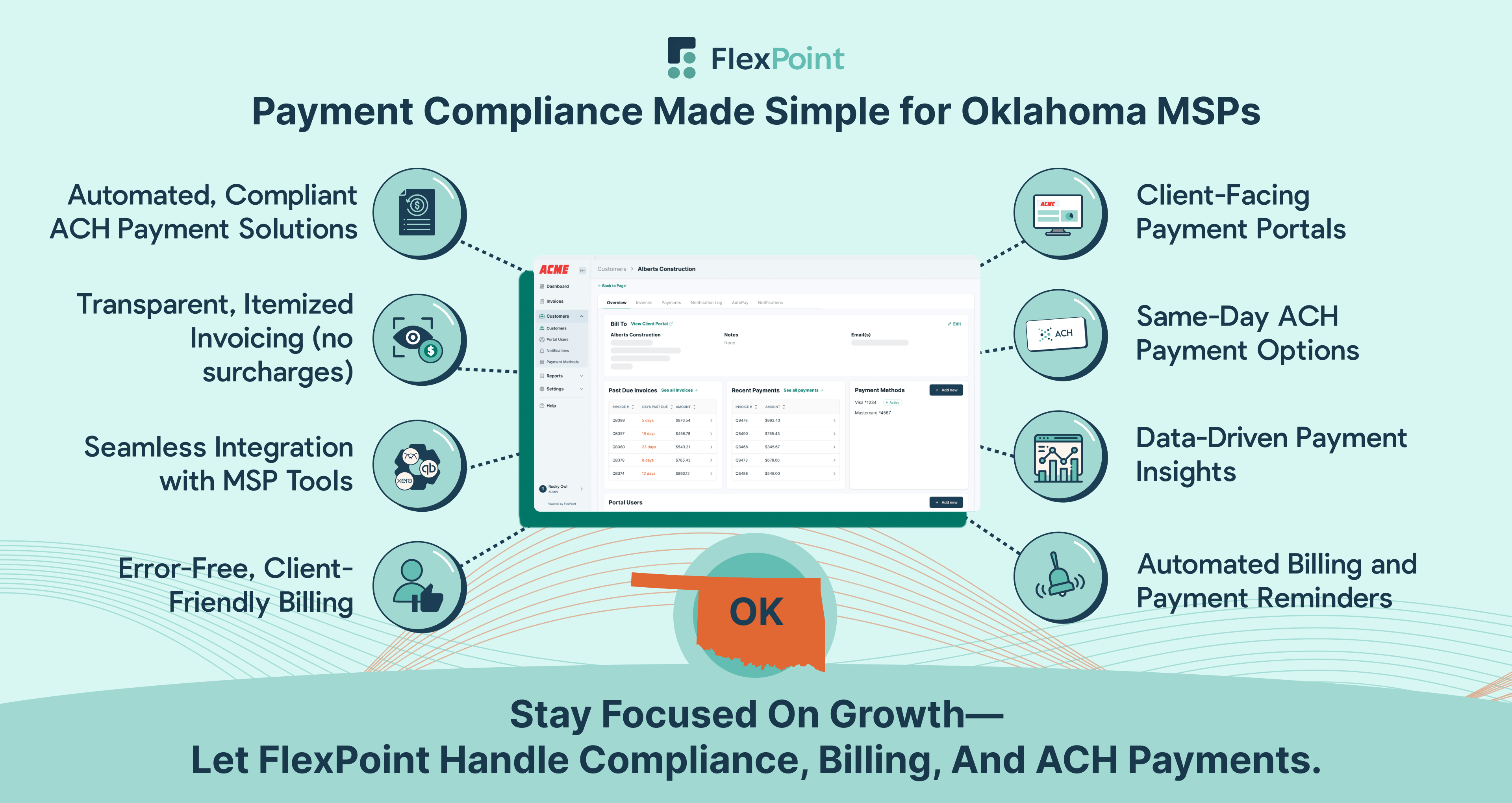
As of [$c-month-year]November 2025[$c-month-year], Oklahoma allows credit card surcharging under strict regulations. According to the Oklahoma Bar Association, "The Legislature has now codified and expanded these rules through Senate Bill 677 (2025), which repeals § 2-417 and amends § 2-211 of the Consumer Credit Code. The new statute makes two major changes: it expressly permits surcharges, but it also caps and regulates them."
This article outlines what Oklahoma MSPs need to understand about the state’s new surcharging permissions and requirements.
It also introduces actionable strategies for managing costs while staying out of regulatory trouble. These include encouraging clients to pay via ACH and using MSP-specific payment automation to streamline billing while reducing exposure to high-fee card transactions.
Disclaimer: This article is for informational purposes only and does not constitute legal advice. Consult qualified legal counsel, and regularly review internal billing procedures to ensure surcharge practices align with state law.
{{toc}}
What is Credit Card Surcharging for Oklahoma MSPs?
Credit card surcharging refers to the process of adding a fee, either as a percentage of the total invoice or as a flat dollar amount, when a client pays with a credit card. The goal is to recover some or all of the processing costs that MSPs incur when clients use a credit card to pay their bills.
In states where surcharging is clearly permitted, MSPs often use this approach to offset credit card charges ranging between 2% and 4% per transaction.
For example, an Oklahoma MSP billing $3,200 for monthly services might apply a 2% surcharge, resulting in an added fee of $64. That surcharge goes toward covering the provider’s own cost to accept the card.
However, card brands (Visa, Mastercard, American Express) place firm limits on what can be charged, typically capping surcharges at 3% or 4%, whichever is lower. They also require specific notices to be given to clients before payment is processed.
MSPs in Oklahoma looking to manage payment costs without crossing compliance lines often turn to options like ACH payments, built-in service pricing, or platforms like FlexPoint. We will discuss these in more detail in upcoming sections.
{{cal-one}}
Understanding Credit Card Surcharging Laws in Oklahoma
The passed Senate Bill 677 (2025) now allows Oklahoma MSPs to implement a surcharge of the lessor of either 1) up to 2% or 2) the actual credit card processing cost.
It's required that you give clients advanced notice of the surcharge that is clear and conspicous.
{{debit-cta}}
Historical Context: Credit Card Surcharging Ban in Oklahoma
Oklahoma’s ban on credit card surcharges was in place for decades under Title 14A §2-417 of the Oklahoma Consumer Credit Code. The statute plainly prohibited any seller from charging more when a client chooses to pay with a credit or debit card instead of cash, check, or a similar method.
This restriction applied equally across industries, making it illegal for MSPs to recover the cost of credit card processing through line-item surcharges.
For years, Oklahoma MSPs either absorbed these costs or quietly adjusted service prices to compensate. The surcharge ban effectively limited how openly MSPs could manage transaction fees, even as other states began to allow surcharging under strict conditions.
The law's longevity was due to its alignment with consumer protection values, which ensured buyers were not penalized for choosing one payment method over another.
The conversation shifted after a series of federal court rulings—including Italian Colors and Rowell—invalidated similar laws in other states, arguing they infringed on commercial speech. The AG noted that Oklahoma’s statute—if interpreted as a restriction on how merchants communicate prices—could raise First Amendment concerns.
Earlier in 2025, Oklahoma passed a new statute under Title 14A of the Oklahoma Consumer Credit Code, that went into effect on November 1, 2025.
Current Legal Status and Its Implications for MSPs
As of [$c-month-year]November 2025[$c-month-year], the statute remains active, which means Oklahoma MSPs can surcharge their clients.
For an MSP that sends a $9,000 invoice with a 2% surcharge, the added fee would be $180.
MSPs considering a surcharge strategy in Oklahoma must understand that they need to follow the new regulations around state and credit card provider surcharging caps.
{{usa-cta}}
Compliant and Cost-Effective Alternatives for Oklahoma MSPs

With Oklahoma’s new surcharge laws, many MSPs are rethinking their payment processing strategies. Since adding fees to credit card transactions could come as a surprise to your clients, switching to lower-cost methods is a safer and more cost-effective approach.
One of the most reliable alternatives is ACH—the Automated Clearing House network, which lets funds move directly between bank accounts without routing through card networks.
For instance, let’s say your Oklahoma MSP sends a $9,300 invoice for monthly cloud management services. If the client pays by ACH, the entire $9,300 goes from their checking account into yours without any cut taken by a credit card processor.
There are no interchange or assessment fees, nor surcharge questions to worry about.
Below, we cover more of the benefits of ACH payments for MSPs.
1. Faster Processing

Using fintech advancements, Same-Day ACH is now available through tools like FlexPoint.
If a client’s payment is authorized before 4:30 PM Eastern Time, the funds can arrive in your business account that day. That gives Oklahoma MSPs faster access to revenue, which helps with cash flow needs like software licensing, contractor payments, or vendor orders.
The ability to clear large payments in hours—not days—means MSPs can operate more agilely and with fewer delays between invoicing and income.
2. Lower Fees On High-Value Payments
For many MSPs, ACH’s most significant appeal is its low cost compared to credit card payments.
ACH payments typically range from $0.25 to $1.00 per transaction. Some providers cap fees entirely, meaning even large transfers don’t lead to unexpected costs.
By comparison, a 2.0% credit card fee on a $9,300 payment would cost $186. If ten clients pay by card every month, that’s over $22,320 in annual fees—just to get paid for the services already rendered.
When those same payments are processed through ACH, total costs might be under $120 for the entire year. That’s a massive difference, especially for MSPs trying to control expenses while scaling operations.
3. Security and Reliability
ACH is also less vulnerable to payment disputes and security risks.
According to a 2023 JP Morgan report, 36% of businesses experienced fraud through corporate credit cards, while 30% reported issues with ACH.
While no system is risk-free, ACH tends to have fewer chargeback-style issues. Even when reversals happen, merchants have better protection if client authorization was documented correctly.
MSPs in Oklahoma also avoid the hassle of chargeback penalties, which can cost upwards of $190 per incident when you factor in fines, recovery fees, and lost labor. Fewer disputes mean fewer operational disruptions.
ACH also removes the administrative burden of dealing with paper checks or payment delays from card issues like expiration or insufficient limits.
4. Client Convenience
From a client’s point of view, ACH payments are dependable and straightforward. Authorization typically involves a one-time bank form, after which recurring invoices are automatically withdrawn.
Clients no longer need to enter card details or chase reminders—they just receive confirmation of payment.
Unlike credit cards, ACH doesn’t run into blocked transactions from spending limits or declined charges from expired cards. If funds are available, the payment clears.
This reliability, combined with the ease of setup, makes ACH ideal for busy clients managing IT budgets, approvals, and accounting processes.
For Oklahoma MSPs operating under new surcharge laws, ACH offers a clean alternative. With tools like FlexPoint, you can route clients to ACH with minimal payment friction, reduce payment costs dramatically, and keep your billing practices compliant, predictable, and client-friendly.
ACH offers the best of all worlds: digital, efficient, inexpensive, and now fast (with same-day processing).
{{ebook-cta}}
How FlexPoint Can Help Oklahoma MSPs Navigate Payment Challenges

MSPs in Oklahoma must take a strategic and cautious approach when it comes to controlling credit card-related expenses.
That’s where FlexPoint comes in. Its MSP-specific payment platform helps Oklahoma MSPs reduce payment processing costs, maintain legal clarity, and improve cash flow without relying on surcharges that could trigger scrutiny from regulators or card brands like Visa/Mastercard.
1. Compliance and Transparency
FlexPoint is designed with regulatory flexibility in mind.
For MSPs that prefer to steer clients toward low-cost options like ACH, FlexPoint allows discounts to be presented as incentives, not penalties.
The platform ensures clients paying with credit cards are not subjected to additional charges that could violate card brand policies or raise red flags with compliance teams.
Detailed records can be pulled at any time, giving MSPs the ability to show clean, well-documented payment trails if questions ever arise from banks, clients, or auditors.
2. Operational Efficiency
FlexPoint helps Oklahoma MSPs simplify collections by automating the most time-consuming parts of billing.
The platform integrates with accounting and MSP software like:
Invoices are generated automatically (based on your pre-set schedule) and paired with payment links that support both ACH and credit card payments. Once a client submits payment, the invoice is marked as paid, the record is updated in the accounting system, and no further action is required.
3. Optimized Cost Management
FlexPoint provides detailed analytics that help Oklahoma MSPs understand exactly where their payment costs are going.
If an MSP processes $600,000 annually, and 35% of that is paid by credit card at an average fee of 2.8%, they’re spending around $5,880 each year just on card fees.
Moving even half of that volume to ACH, which typically costs $0.25 to $1.00 per transaction, could save thousands.
The platform also supports Same-Day ACH at no extra charge for a set processing amount each month, helping MSPs improve cash flow without incurring additional processing costs.
Your MSP's use of FlexPoint for billing also benefits clients. At checkout, they’re presented with clear, fee-free options, making it easy to choose ACH without confusion or concern about being penalized for using a credit card. This transparency fosters trust and reduces billing disputes.
Considering that surcharge laws have recently changed in Oklahoma, FlexPoint offers a practical way to modernize payments, encourage cost-saving behavior, and operate within the legal gray area without crossing the line.

From automated workflows to data-driven insights, FlexPoint helps providers take control of their payment processing without compromising compliance or client satisfaction.
Conclusion: Adopting Cost-Effective, Compliant Payment Practices

Rather than upsetting clients with new surcharges, MSPs can adopt strategies that improve cost recovery without inviting client dissatisfaction or violating card brand policies.
The key is to understand both what the statute says and what it aims to prevent: pricing practices that penalize clients for their choice of payment method. MSPs that keep this intent in mind can design billing systems that remain compliant while also supporting financial sustainability.
Encouraging the use of ACH, applying clearly disclosed cash discounts, and accelerating collections through Same-Day ACH are all practical ways Oklahoma MSPs can protect their margins. These methods reduce dependency on credit cards, minimize processing fees, and align with both state expectations and industry rules.
Ultimately, the goal is to build a payment experience that helps your MSP stay profitable, fosters trust with clients, and respects the current legal boundaries in Oklahoma. Despite the statute’s ambiguity, MSPs have plenty of room to operate wisely and efficiently.
With tools like FlexPoint, it becomes much easier to automate these workflows, keep invoices consistent, and provide clients with transparent, well-structured payment options.
FlexPoint allows you to enforce billing practices that reflect your legal obligations while still supporting operational goals.
Maximize your MSP’s profitability with FlexPoint’s compliant payment solutions.
From ACH to automated invoicing, FlexPoint helps your MSP reduce costs and simplify billing in Oklahoma.
Schedule a demo today to learn more.
{{demo-cta}}
Additional FAQs: Credit Card Surcharging in Oklahoma for MSPs
{{faq-section}}






